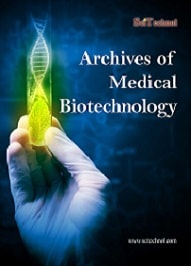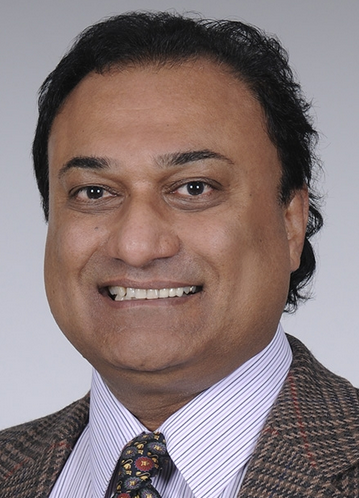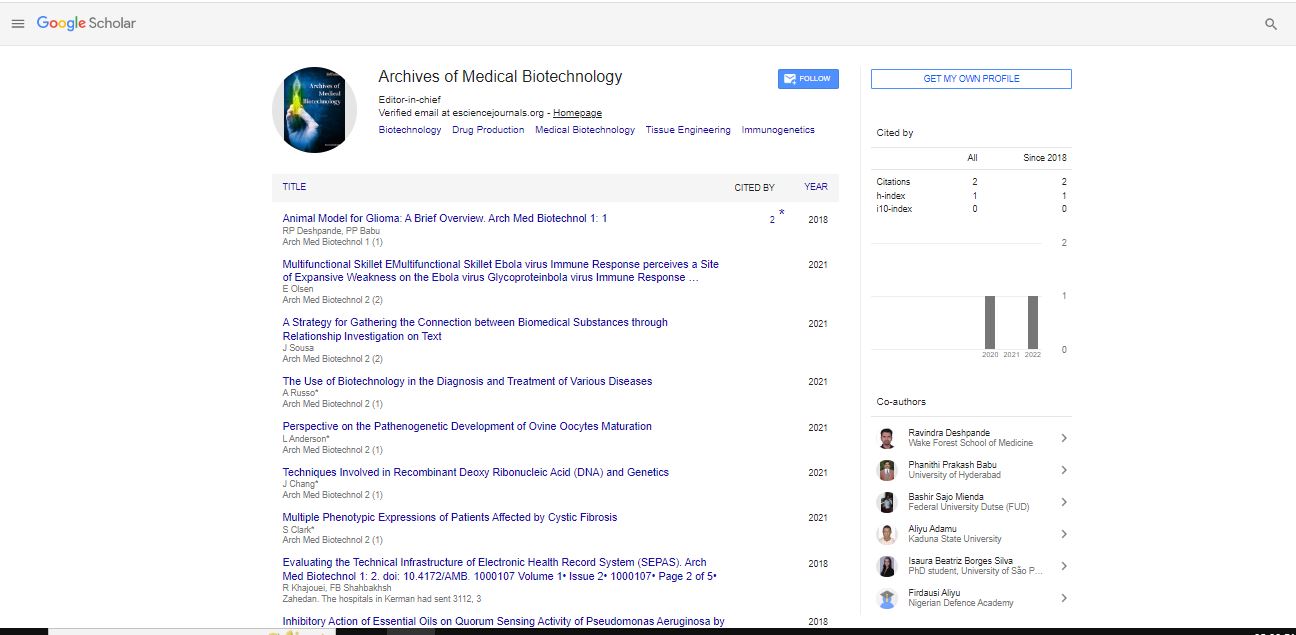About the Archives of Medical Biotechnology

Archives of Medical Biotechnology is a multidisciplinary, open access, peer-reviewed, scientific journal that focusses on the publication of scientific manuscripts pertaining to avant-gardemedical biotechnological research studies. Medical biotechnology involves congregation of basic concepts in cell biology, microbiology, molecular biology and bioinformatics for the development of cutting edge pharmaceutical agents. The medical biotechnology research findings ameliorate the process of development of novel diagnostic and therapeutic tools for the detection and treatment of acute and chronic diseases.
Archives of Medical Biotechnology journal strives for the wide spread promulgation of manuscripts related to recent developments in the field of applied medical sciences.The journal is an excellent rostrum for showcasing advanced medical research innovations pertaining to the development of advanced tools and techniques for medical and pharmaceutical applications viz. prosthetics limbs, portable dialysis machine, muscle stimulators, nerve regenerators, absorbable heart stent, contact lenses, diagnostic tool kits etc.
The foremost objective of the journal is to augment the furtherance of medical biotechnological research and development of novel biomedical principles, methods, tools and techniques with direct or indirect biomedical implications. The journal maintains exemplary standards regarding the originality and clinical importance of the accepted manuscripts. The worldwide dispersal of the published articles enhances their scientific impact and practical applicability.
Biotechnology
Biotechnology deals with cellular and molecular process to develop technologies that helps to modify the way of living. It is also defined as the proper use of living organism, cells and cellular components for the genetic development of living things which is helpful for man.
Drug Production
The number of drugs obtained by biotechnological origin available for many contrasting diseases has increased more and more rapidly like cancer, diabetes mellitus and other infectious diseases. The pharmaceutical industry has used biotechnology to attain new and promising active ingredients by recombinant DNA technology, hybridoma technology, etc.
Nano-biotechnology
The application of nanotechnology in the field of biotechnology is simply known as nano-biotechnology.
Nano biotechnology is basically the creation of functional materials, devices and systems, through understanding the control of matter at dimensions between 1-100nm. In simple words, nano biotechnology is controlling of matter on an atomic and molecular scale.
Medical Biotechnology
Medical Biotechnology also called as red biotechnology is the use of organisms and organisms-isolated materials for research and to produce diagnostic and therapeutic products that help to treat and prevent human diseases. The aim of medical biotechnology is the Prevention, Diagnosis and Treatment of diseases. The principles of medical biotechnology are applied in pharmacology, gene therapy, stem cells and tissue engineering. Medical biotechnology is a rapidly evolving field integrating knowledge obtained in molecular, cell biological, genetic and immunological scientific areas.
Tissue Engineering
Tissue Engineering is a scientific field that focus on developing tissues and organs by biological, biomechanical or biophysical methods in vitro. It covers many other fields such as cell and molecular biology, medicine, chemistry and engineering etc. Tissue Engineering solves many problems by using living cells as engineering materials.
Immunogenetics
Immunogenetics is a scientific discipline which uses basic principles and methods of immunology to study the inheritance of traits in humans. This branch of medical genetics explores the other brances of immune systems and genetics.
Human Genetics
Human Genetics is the branch of science concerned with genes, genetic variation and heredity in living organisms and genetic aspects of humans as a species. Genetic information is the information about an individual’s genetic tests and the genetic tests of an individual’s family members, as well as information about the disease or disorder in an individual’s family members. Family medical history is also important because it is often used to determine whether someone has an increased risk of getting a disease, disorder, or condition in the future. Progress in molecular biology has clarified the molecular structure of chromosomes and their constituent genes and the ways in which change in the molecular structure of a gene helps to overcome a disease. The genetic information of the developing human is stored in coded form within molecules of DNA (deoxyribonucleic acid). DNA is composed of a chain like arrangement of smaller molecules known as nucleotides, which forms a code that contains information and it defines the structure of various protein molecules.
Vaccines
We all know that vaccine is a biological preparation and it helps us to improve our immune system. The field of biotechnology has also played a vital role in developing vaccines against severe diseases. Of the many promises of the biotechnological revolution, one is development of vaccines through recombinant DNA technology.
Pharmacology
The strategies for the development of newly and more efficient drugs for the evaluation of the effects of chemicals on cell and tissue at a lower cost are considerably changing. This is made possible by areas of science, specially biotechnology. The recent and more sophisticated technologies have largely influenced the areas of pharmacology.
Production of genetically engineered human insulin, Human Growth Hormone, Human Blood Clotting Factor, and Monoclonal Antibodies are examples of how biotechnology has contributed to the field of pharmacology.
Gene Therapy
Gene is responsible for all the physical & mental characteristics which carries out from one generation to other. Gene therapy is a technique for the correction of defective genes, it involves by inserting one or more corrective genes that have been designed in laboratory, into the genetic material of a patient's cells to overcome a genetic disorder.
Stem Cells
Stem cell research have a contribution as a central role in regenerative medicine, which also spans the disciplines of tissue engineering, cellular therapeutics, gene therapy, developmental cell biology, biomaterials, chemical biology and nanotechnology. Stem cells have remarkable potentials to develop into different types of cell in the body during early life and growth. In many tissues stem cell act as a sort of internal repair system, dividing essentially without limit to replenish other cells as long as the person or animal is still alive.
Biomedical Engineering
Biomedical engineering is the application of the principles techniques of engineering to biology and medicine.
Biomedical engineering focuses on the advances that improve human health and health care at all levels.
It includes including the design and development of active and passive medical devices, orthopedic implants, medical imaging, biomedical signal processing, tissue and stem cell engineering, and clinical engineering, just to name a few.
Medical devices
Biotechnology offers advanced and modern medical devices for diagnostics and preventive purposes. In todays time, human health is an issue of great concern and can’t be ignored. Here, biotechnology plays a major role by providing flexibility to improve human health by promising techniques.
Pharmocogenomics
Different individuals react differently to the same drug or treatment, so the vision of pharmacogenomics is to be able to design and produce drugs that are adapted to each person’s genetic factor. The purpose of pharmacogenomic testing is to figure out if a medication is right for an individual human. A small blood or saliva sample can help to determine whether a medication may be an effective treatment for a human, what is the best dose of a medication for a patient, whether a human could have serious side effects from a medication or not.
Biopharmaceutics
In modern medicine industry biopharmaceutical technique poses one third of the manufacturing process. In this process the drugs are produced by following the biotechnological method like genetic engineering, Recombinant DNA technology gene transfer& antibody production method. Biopharmaceutical Drug is a protein molecule which derived from living organism cell. Biopharmaceutical drugs are used to fight cancer, diabetes, hepatitis, viral infections, etc.
Molecular Medicine
Molecular medicine is a branch of medicine that develops the ways to diagnose and treat disease by understanding the way genes, proteins and other cellular molecules work. It is based on research that shows how certain genes, molecules, and cellular functions may become abnormal in diseases such as cancer.
Fast Editorial Execution and Review Process (FEE-Review Process):
Archives of Medical Biotechnology is participating in the Fast Editorial Execution and Review Process (FEE-Review Process) with an additional prepayment of $99 apart from the regular article processing fee. Fast Editorial Execution and Review Process is a special service for the article that enables it to get a faster response in the pre-review stage from the handling editor as well as a review from the reviewer. An author can get a faster response of pre-review maximum in 3 days since submission, and a review process by the reviewer maximum in 5 days, followed by revision/publication in 2 days. If the article gets notified for revision by the handling editor, then it will take another 5 days for external review by the previous reviewer or alternative reviewer.
Acceptance of manuscripts is driven entirely by handling editorial team considerations and independent peer-review, ensuring the highest standards are maintained no matter the route to regular peer-reviewed publication or a fast editorial review process. The handling editor and the article contributor are responsible for adhering to scientific standards. The article FEE-Review process of $99 will not be refunded even if the article is rejected or withdrawn for publication.
The corresponding author or institution/organization is responsible for making the manuscript FEE-Review Process payment. The additional FEE-Review Process payment covers the fast review processing and quick editorial decisions, and regular article publication covers the preparation in various formats for online publication, securing full-text inclusion in a number of permanent archives like HTML, XML, and PDF, and feeding to different indexing agencies.
 Spanish
Spanish  Chinese
Chinese  Russian
Russian  German
German  French
French  Japanese
Japanese  Portuguese
Portuguese  Hindi
Hindi 
